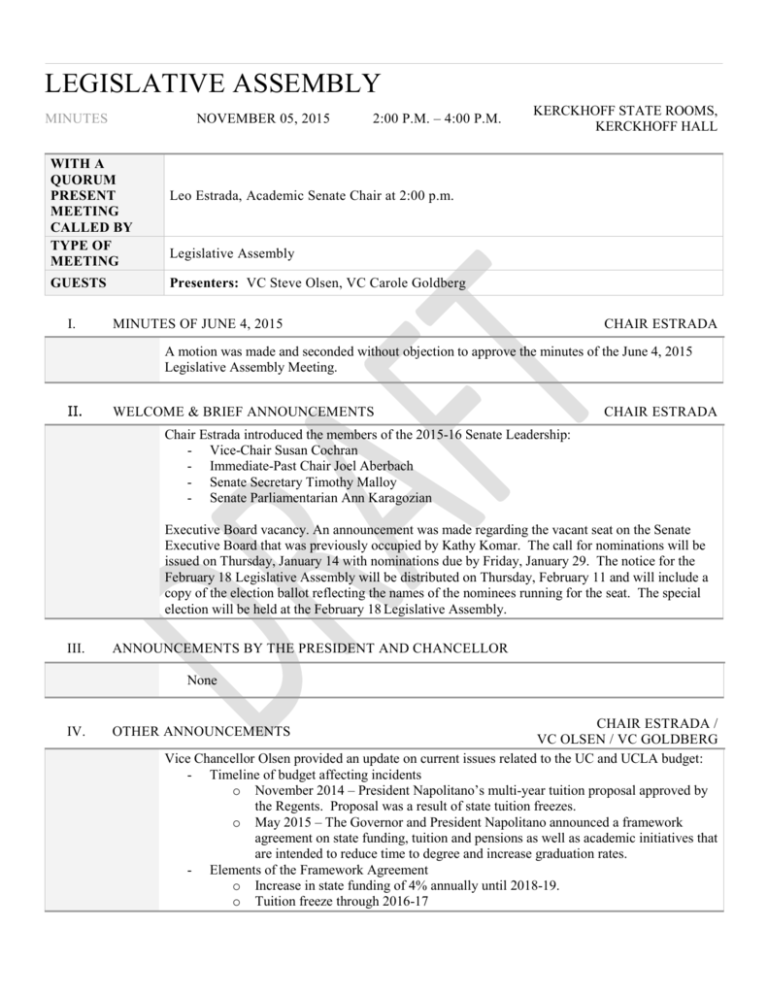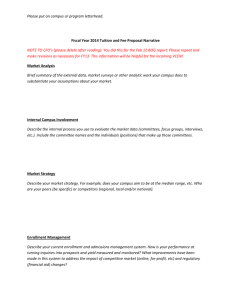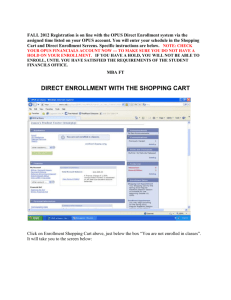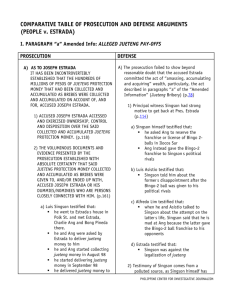
LEGISLATIVE ASSEMBLY
MINUTES
NOVEMBER 05, 2015
WITH A
QUORUM
PRESENT
MEETING
CALLED BY
TYPE OF
MEETING
GUESTS
I.
2:00 P.M. – 4:00 P.M.
KERCKHOFF STATE ROOMS,
KERCKHOFF HALL
Leo Estrada, Academic Senate Chair at 2:00 p.m.
Legislative Assembly
Presenters: VC Steve Olsen, VC Carole Goldberg
MINUTES OF JUNE 4, 2015
CHAIR ESTRADA
A motion was made and seconded without objection to approve the minutes of the June 4, 2015
Legislative Assembly Meeting.
II.
WELCOME & BRIEF ANNOUNCEMENTS
CHAIR ESTRADA
Chair Estrada introduced the members of the 2015-16 Senate Leadership:
- Vice-Chair Susan Cochran
- Immediate-Past Chair Joel Aberbach
- Senate Secretary Timothy Malloy
- Senate Parliamentarian Ann Karagozian
Executive Board vacancy. An announcement was made regarding the vacant seat on the Senate
Executive Board that was previously occupied by Kathy Komar. The call for nominations will be
issued on Thursday, January 14 with nominations due by Friday, January 29. The notice for the
February 18 Legislative Assembly will be distributed on Thursday, February 11 and will include a
copy of the election ballot reflecting the names of the nominees running for the seat. The special
election will be held at the February 18 Legislative Assembly.
III.
ANNOUNCEMENTS BY THE PRESIDENT AND CHANCELLOR
None
IV.
CHAIR ESTRADA /
VC OLSEN / VC GOLDBERG
Vice Chancellor Olsen provided an update on current issues related to the UC and UCLA budget:
- Timeline of budget affecting incidents
o November 2014 – President Napolitano’s multi-year tuition proposal approved by
the Regents. Proposal was a result of state tuition freezes.
o May 2015 – The Governor and President Napolitano announced a framework
agreement on state funding, tuition and pensions as well as academic initiatives that
are intended to reduce time to degree and increase graduation rates.
- Elements of the Framework Agreement
o Increase in state funding of 4% annually until 2018-19.
o Tuition freeze through 2016-17
OTHER ANNOUNCEMENTS
Pension provisions of $436 million from the state over three years with conditions
of the adoption of a new pension tier for new hires with employees having the
option of a defined contribution plan.
o Increased academic performance by increasing graduation rates and reducing time
to degree. Achieved by improving the transfer function on campus and increasing
online course offerings along with a number of other initiatives.
- UC negotiation with Legislature on 2015-16 budget
o UC was tasked with proposing enrollment changes in their proposals to the
legislature. UC proposed an additional $50 million in state funds to increase
enrollment.
o Legislature agreed to a $25 million increase in funding for the enrollment of 5,000
resident undergraduate students in 2016-17.
- Impact on UCLA
o Due to rebenching, UCLA will receive almost none of the base funding from the
state over the next two years.
o UCLA will only see revenue from the enrollment of 600 resident undergraduate
students which would generate $3 million in state funds and $5 million in tuition
revenue. This would require the campus to increase resources such as faculty,
classrooms, and other necessary elements to accommodate the increased
enrollment.
- Funding Priorities for 2016-17
o Teaching undergraduate courses – faculty hiring, teaching assistants, financial aid,
academic counseling, health services
o Information Technology – cyber security, enterprise systems
o Capital Investments – classroom improvements, seismic retrofits, deferred
maintenance, fire safety
o Mandatory compliance
o Centennial Campaign
The following questions and concerns from assembly representatives were addressed by Vice
Chancellor Olsen:
- As a result of the most recent major flood on campus, UCLA has had the opportunity to
learn from the event and equip itself for future incidences. It appears that the DWP will pay
all claims.
- The increased enrollment of undergraduate students will not result in a lowering of the
admissions standards. In order to address the increase in students, audits of classrooms and
available space are occurring, improved software systems for scheduling classes are being
utilized, and the creation of new teaching spaces, such as the School of Medicine’s Geffen
Hall, will free up previously occupied classrooms.
- The unfunded liability in the current pension system is close to $13 billion. The pension
situation is stabilized and has no liquidity concerns, although it is not completely funded
(76% of liability is funded).
- UCLA, in comparison to the other UC campuses, continues to have the best performance in
terms of having the lowest undergraduate freshman time to degree. Graduation rates within
4-years are 74% and 6-years are at 90%. This is attributed to good students, good faculty,
and addressing bottlenecks for requisite classes.
o
VC Goldberg provided an update on current issues related to the Academic Personnel Opus system:
- The Opus system was designed to achieve consistency in data sources across campus. It
was further designed to improve the academic personnel review process and replace the
paper file system that is currently being utilized.
- The Opus system will include the entire academic series faculty.
- Aggregates data from more than 30 sources, provides a system of electronic academic
reviews, and establishes public profiles for faculty.
-
Eliminates the Dossier Action Tracking (DAT) system that was previously used by some
departments to process personnel actions.
- Designed to be as easy to use as other commercial websites with the goal to make the
system as self-explanatory and intuitive as possible.
- Individual faculty are able to view the current status of their personnel actions and
administrators are able to identify where a case may currently be and if it is pending an
action by a specific party.
- One of the goals during the development of the system was to implement adequate security
measures in order to protect data and information contained within the program. This has
been done in coordination with the Privacy Board, Information Technology Planning
Board, the Opus Steering Committee, and campus information technology security officers.
- Opus features available by spring 2016:
o Faculty dashboard – case tracking and eligibility
o Academic review of merit cases
The following questions and concerns from assembly representatives were addressed by Vice
Chancellor Goldberg:
- Current merit reviews will address publications since the last merit review. Many of the
current publications will also automatically upload to faculty profiles through the UC
Publications management tool. Opus will integrate with the management tool.
- If artistic performance material does not render appropriately in the Opus system, it will not
be forced into the electronic formats that might affect the quality of the piece and will be
transmitted by other means. The steering committee has had representation from the arts to
address issues such as this.
- Opus is supported by off-site backup systems.
- Opus is an aggregation of information and data in vast quantities making information more
easily available than before. Freedom of Information Act requests are concerns of the
faculty and administrators, however the gains of having this aggregation of information and
analytic capability available in one place outweighs the risks that might be posed in
compiling the data. Improper use of the data is also being addressed by the data
governance taskforce.
V.
CONSENT CALENDAR
CHAIR ESTRADA
A motion was made and seconded without objection to approve the following items presented on
the consent calendar:
VI.
2015-16 Committee on Committees Slate
Departmental Bylaw for the Department of Music
SPECIAL ORDERS – CONSENT CALENDAR
CHAIR ESTRADA
A motion was made and seconded without objection to approve the following items presented on
the special orders consent calendar:
-
Academic Senate Committee Annual Reports
o Committee on Library and Scholarly Communications 2014-15
o Committee on Development 2013-14
o Committee on Development 2014-15
o Council on Planning and Budget 2014-15
o Undergraduate Council 2013-14
o Undergraduate Council 2014-15
o Graduate Council 2014-15
o Committee on Rules & Jurisdiction 2014-15
o
o
VII.
Committee on Academic Freedom 2014-15
Committee on Undergraduate Admissions and Relations with Schools (2014-15)
REPORTS OF SPECIAL COMMITTEES
None
VIII.
REPORTS OF STANDING COMMITTEES
None
IX.
PETITIONS OF STUDENTS
None
X.
UNFINISHED BUSINESS
None
XI.
UNIVERSITY AND FACULTY WELFARE
CHAIR ESTRADA
Updates on UC and Campus Issues
• Senior administrative positions in the Academic Planning and Budget office will soon be
filled.
• A number of dean positions will be filled during the course of the year.
• Pension Task Force – looking at competitiveness, sustainability, and savings in developing
a pension plan for new hires after July 1, 2016. Report expected to be available on January
15, 2016.
• New training is being developed to address issues of sexual violence and sexual
harassment.
• Cyber Security assessments have exposed various issues especially in the area of server
integrity. New minimum standards of security will be implemented across campus
including encryption requirements and data management restrictions.
• UCLA will increase enrollment by approximately 400 first year resident students and 200
transfer students, the majority of which will be in engineering. The EVC has expressed a
commitment to increasing faculty hiring to address this growth. This will also result in the
increased need for teaching assistants which is a significant concern on campus.
• Transfer pathways are being identified to establish equivalences between classes taught at
the UCs and community colleges in order to ease the transfer process for students.
• Efforts are increasing to create three-year BA/BS programs with the goal of increasing the
number of students taking advantage of this option from 3% to 5%. This is part of the
larger effort to decrease the time to degree at the UC.
• Chair Estrada announced a change in the practice of the distribution of the LgA draft
minutes in order to streamline processes and respond to Legislative Assembly actions
sooner. Draft minutes for Legislative Assembly meetings will be distributed approximately
three weeks after the meeting at which the action was decided. This will make actions
effective ten instructional days after distribution of the draft minutes. Approval of the
minutes will still take place at subsequent Legislative Assembly meetings.
XII.
NEW BUSINESS
None
The meeting was adjourned at 3:45pm.
CHAIR LEO ESTRADA







